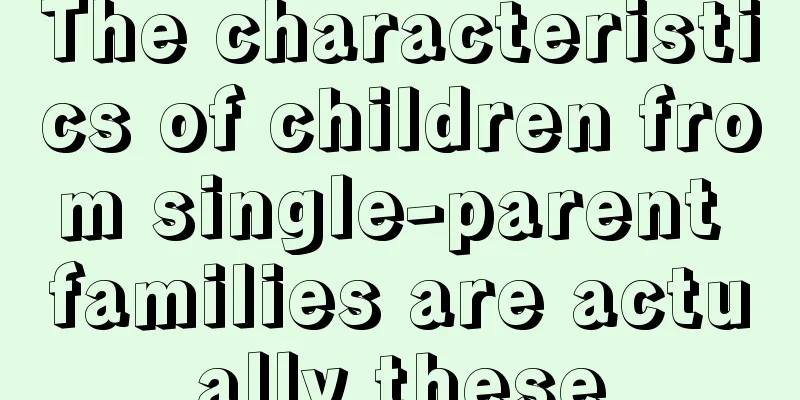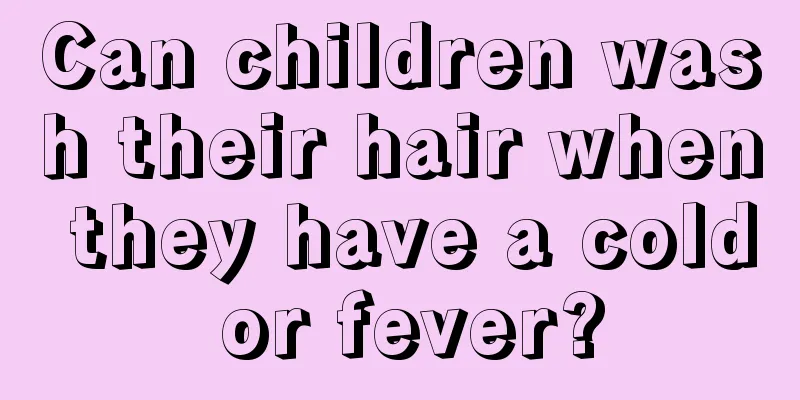The characteristics of children from single-parent families are actually these

|
The education of children from single-parent families has always been a hot topic of widespread concern in society, but if you want to educate children from single-parent families well, you must understand the characteristics of children from single-parent families. So what are the characteristics of children from single-parent families? In fact, feelings of rejection, anger, and lack of security are all characteristics of children from single-parent families, and parents and teachers must pay attention to them. Rejection This is one of the most profound feelings of teenagers growing up in a single-parent environment. Whether the children's parents are dead or divorced, they all feel rejected. Teens are particularly sensitive to rejection, whether expressed or perceived. Because a single father or mother has to cope with the burden of life alone, he or she may not be at home most of the time and may miss some important holidays or occasions. Although the child knows that the father or mother has done his or her best, the feeling of rejection may still persist emotionally. Feeling angry When children are emotionally confused, they feel angry. When a parent dies, the child feels that he or she has been deceived and has lost the support and love of the parent. Divorce can exacerbate these emotions, especially for the person who is leaving. However, teenagers often do not express their anger towards the parent who left. Instead, they get angry at the parent who raised them and use the parent at home as the object of their anger. Insecurity or low self-esteem There are three factors that undermine their sense of self-worth: the environment that led to their parents' divorce; the divorce process; and the circumstances after their parents' divorce. They may feel very different from their friends who have intact families. Suspicious and jealous Compared with children from normal families, children from single-parent families are about 3% more likely to have stronger suspicious and jealous psychological characteristics than children from single-parent families. It manifests itself in being very sensitive to other people's discussions and many things. He always suspects that others are talking about him, and wonders if others are saying bad things about him. He suspects that the teacher no longer trusts him. If he is not allowed to participate in an activity, he will have all kinds of wild thoughts. I think the emergence of this mentality is related to inferiority complex. Subconsciously, people are still afraid that others will look down on them, so they become suspicious and jealous. Behavioral withdrawal When people are hurt in a relationship, their natural reaction is to withdraw, to refuse to speak, to be unwilling to give love and care. Children from single-parent families may feel distant from their parents and suddenly alienated by their friends - even if their relatives, friends, classmates or teachers do not look at or judge them differently, they may still alienate these people. They will feel that fate is unfair and why this happens in my family? In the behavior of self-withdrawal, many teenagers will feel very lonely, feel that they have no friends and are very helpless. Therefore, you may feel depressed emotionally. Based on the characteristics of children from single-parent families, they can be divided into four types: self-reliant and self-reliant, lonely and depressed, uninhibited and permissive, and paranoid and irritable. I hope teachers can give these children more care and encouragement and cultivate good personalities. |
<<: Parents must know the personality development of girls from single-parent families
>>: What should I do if my child has low white blood cell count? Mothers must know
Recommend
Is it good for children to eat dragon fruit?
Dragon fruit is a tropical fruit. It is not only ...
What symptoms does potassium deficiency cause in children?
When children are deficient in potassium, parents...
What is the saying about whether babies should use pillows?
We adults must use pillows when we sleep, because...
What should I do if my child has diarrhea due to indigestion?
Since children are in the developmental period, t...
What to do if your child skips school
Books are the ladder of human progress. The reaso...
How to deal with a picky eater
Children's picky eating habits will directly ...
At what age is it appropriate for children to undergo circumcision?
Many boys are born with long foreskins, but many ...
What are the early signs of autism in children?
Children's mental health development is a ver...
How old is the baby before he can lift his head while lying on his stomach? New parents should pay attention to the growth rules
A baby's body will undergo different changes ...
What should a 5-year-old child with poor resistance eat?
Children have poor resistance, so try not to take...
What to do if your baby cries before going to bed
Why do babies always cry before going to bed? Whe...
What are the causes of leg pain in children?
Many children have told their parents about their...
What should I do if my baby has prickly heat all over his head?
In summer, since the baby's skin is relativel...
What's wrong with the child's stomach gas?
Stomach gas is a very common phenomenon in daily ...
What to do if the baby wakes up easily during sleep
What parents worry about most is probably that th...









